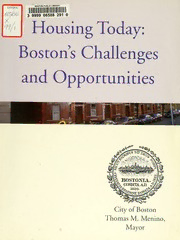
Housing today: Boston's challenges and opportunities PDF
Preview Housing today: Boston's challenges and opportunities
BOSTONPUBLIC LIBRARY 3 9999 06588 291 Housing Today: Bostons Challenges and Opportunities City of Boston Thomas M. Menino, Mayor • Housing Today: Bostons Challenges and Opportunities City of Boston Thomas M. Menino, Mayor r lal v Table of Contents Executive Summary. i-ii Introduction 1 Quality ofLife in Boston 6 Bostons Housing Challenges 8 Boston's Housing Goals 10 Goal A: Empower New and Existing Homeowners 10 Goal B: Homeownership Development 13 Goal C: Rental Housing Preservation 15 Goal D: Rental Housing Development 19 Goal E: Housing for Vulnerable Residents 21 Conclusion 25 EXECUTIVE SUMMARY: When I became mayor ofBoston in 1993, one ofmy top priorities was to create a housing and neighborhood stabilization plan. The plan reflected the economic realityofthe times: aweakeconomy and a real estate market in free-fall. Foreclosure rateswere astronomical and the number ofabandoned buildingsskyrocketedto over4,500 in 1993. Theplan called foran ambitious homeownership strategy designed to create 8,000 new homeowners in Boston over a four-year period. In 1996, I convened an advisory panel on housing to study the impending end ofrent control and its effect on Boston's housing market and the economy in general. While the main goal of the 1996 strategywas to create mechanisms to cushion the end ofrent control, increased homeownership was again a major focus. Whilewe havesuccessfullymetorexceeded manyofourearlierhousinggoals, Boston continues to face a severe housing shortage. Accordingly, I have placed housing at the top of myadministrations agenda for 1999. In 1999, the City ofBoston will invest $25 million dollars in housing to create 2,000 homes for the residents of Boston. That funding includes $10 million ofCity revenue for the preservation and expansion ofBostons housing stock. That marks the first time in history that the City has put its own money into housing. As a symbol of my commitment to addressing the housing crisis, a new Cabinet position has been created specifically for Neighborhood Development. The Director ofthe Department of Neighborhood Development now serves as Cabinet Chief- putting that position on par with public safety, education and the environment. I believe that in order for my administration's housing policy to positively impact our neighborhoods, citizens must be educated and involved in the process. Accordingly, this report is designed to provide a concise overview ofthis administration's housing priorities, goals and policies. In simple, easy to read text, this report explains the housing challenges facing the city and myadministrations policies and programs to address those challenges. It explains how the administration targets funds in order to get the most out ofevery dollar the City puts in to housing. It reflects my commitment to ensuring that Boston remains the kind ofcity where people can and want to buy homes and raise their families. The report is organized around the MeninoAdministration's five central housinggoals: Empower new and existing homeowners Expand homeownership opportunities citywide Preserve existing rental housing Encourage the production ofnew rental housing Protect our most vulnerable residents It is my hope that this document will help citizens, neighborhood organizations, community development corporations, developers and businesses rally around the issue of housingandworkwith us to make Boston a citywhere all its residents live in clean, safe, decent affordable homes. Thomas M. Menino, Mayor City ofBoston INTRODUCTION Boston is currently enjoying one ofthe most prosperous periods in recent history. The city's economy is stronger than it has been in over thirty years. Unemployment is down, crime rates are at their lowest in three decades, property values are up, population figures are holding steady, private investment in the city is at an all time high and Boston's bond rating is the best it has ever been. Yet Boston is facing a severe housing crisis. There is an insufficient supply of housing, and affordable housing in particular, for renters and owners ofall but the highest incomes. According to HUD's 1998 State of the Cities report, cities nationwide continue to face two main challenges: 1) The triple threat ofconcentrated poverty, shrinking populations and middle-class flight that began two decades ago, and 2) Three fundamental opportunity gaps - in jobs, education and housing - that are critical to reducing poverty and attracting, retaining and developing middle- class families. The Menino Administration believes that these two challenges are directly related to the need for increased affordable housing opportunities. Accordingly, the Administration is committed to preservingand increasing the supply ofaffordable housing for both renters and homebuyers in Boston. During the late 1980s and early 90s, Boston, like many other American cities, experienced substantial middle-class flight. People were leaving cities in favor ofwhat they believed were greener, safer, quieter suburbs. For several years, the statistics on urban flight painted a bleak picture for cities. But by the mid-1990s the tide turned in Boston. The economy rebounded, innovative crime fighting strategies began to take hold, and slowly the outward migration figures began to reverse themselves. While people were fleeing the city in droves less than a decade ago, Boston's real estate market quickly becameoneofthehottest in thecountry. Neighborhoodsoncemarredbyviolence, abandoned housing, disinvestment and economic stagnation have been revitalized, with the help ofthe public and private sectors, andnowserveasmodelcommunities. Althoughthecurrenteconomicprosperityhascontributed to a higher quality oflife for most Bostonians, it has also contributed to higher housing costs. Boston is unique because it still has a middle class. ManyAmerican cities are left onlywith a population comprised oftheveryrich and theverypoor. Wehave managed to avoid this fate so far, but Boston is at risk oflosing its middle class because there simply are not enough affordable homes for families to rent or buy. The Menino Administration is committed to ensuring that Boston remains a citywhere residents ofall incomes can find homes in which to build their lives. 1 Digitized by the Internet Archive in 2011 with funding from Boston Public Library http://www.archive.org/details/housingtodaybostOObost
